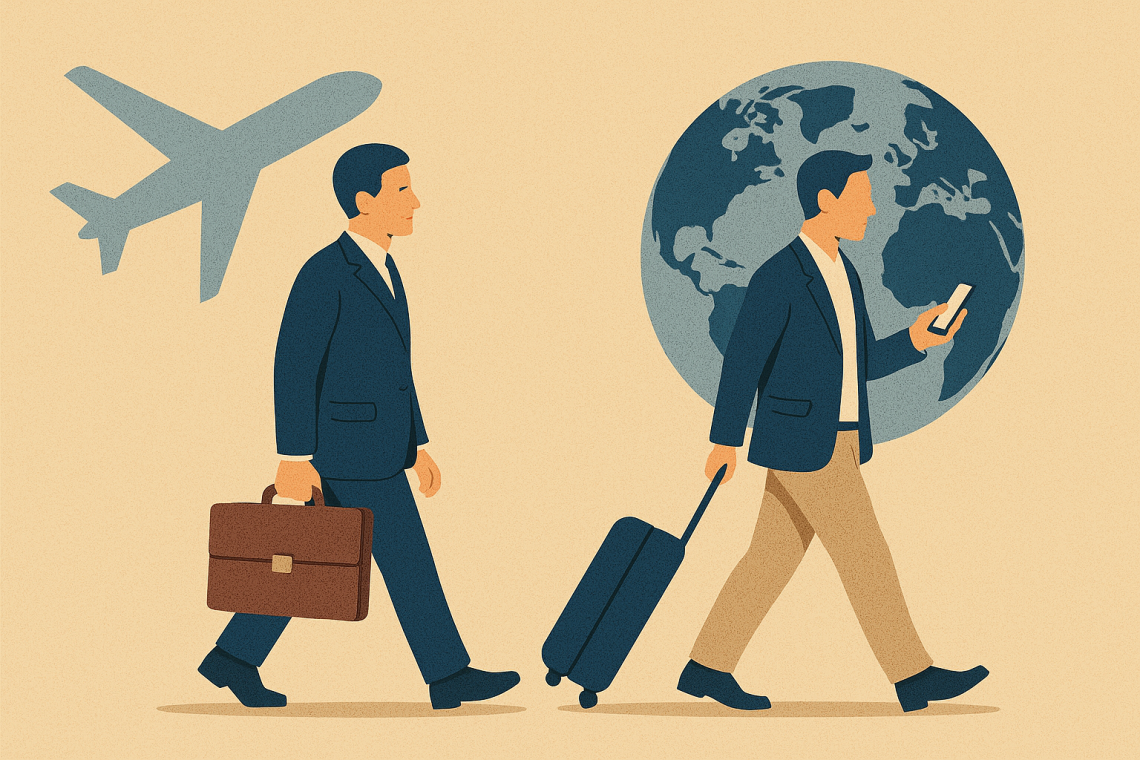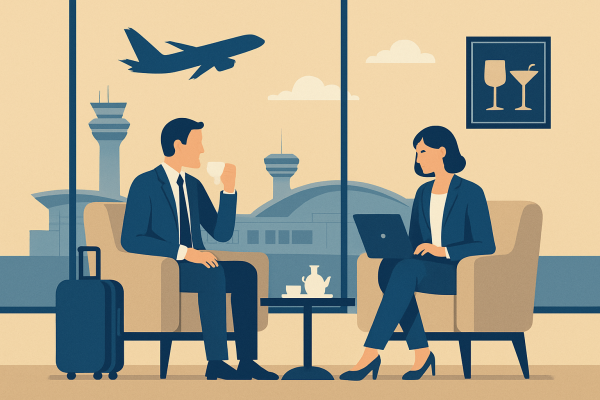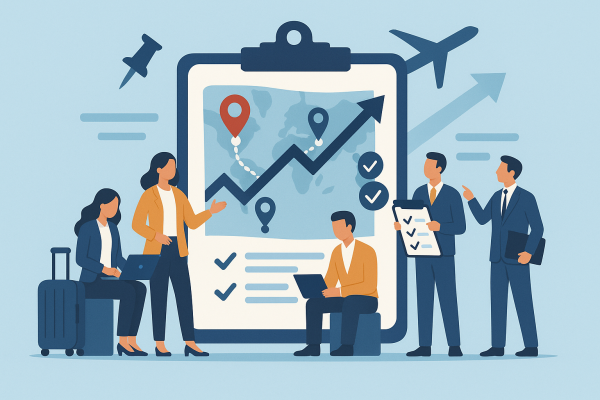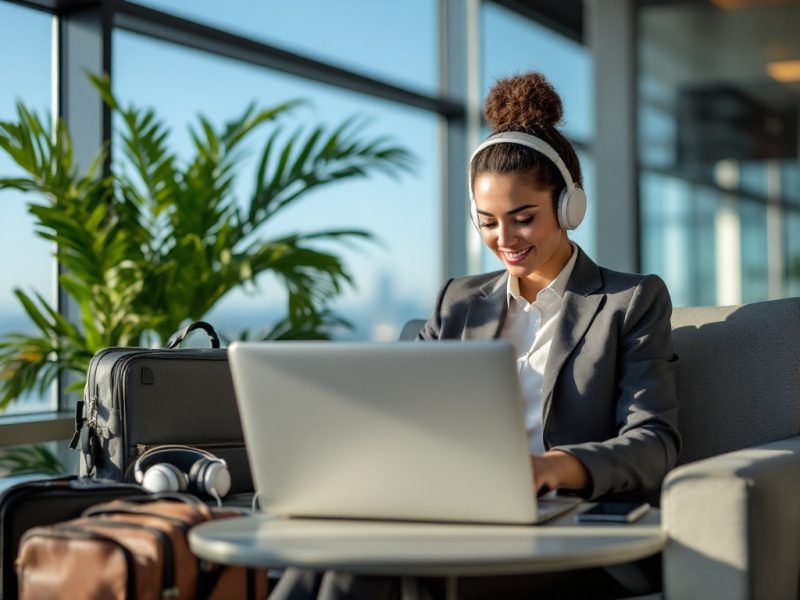The Evolution of What is a Business Trip: From Traditional to Modern Approaches
From ancient trade routes to today’s AI-powered trips, business travel has always been vital. Discover how technology, globalization, and millennial preferences are reshaping the corporate travel landscape. Explore the shift from rigid itineraries to personalized experiences, the rise of bleisure travel, and the increasing focus on sustainability. Learn how to optimize your company’s travel policies for cost savings and employee well-being. Dive in to understand the future of business travel and gain valuable insights for your organization.
Important information
- Technology like video conferencing and online collaboration tools has reduced the need for frequent business travel, shifting the focus to higher-impact events.
- Modern business travel prioritizes employee well-being, personalized experiences, and flexible travel policies, influenced by millennial travel preferences.
- Companies are increasingly adopting sustainable travel practices, like carbon offsetting and eco-friendly choices, to minimize environmental impact.
- Remote work significantly impacts business travel, leading to fewer trips and the rise of hybrid events, yet in-person interactions remain crucial for relationship building and complex projects.
- AI and travel software are transforming travel management by automating tasks, providing personalized recommendations, and optimizing travel efficiency and costs.
The Evolution of What is a Business Trip: From Traditional to Modern Approaches
From ancient merchants traversing vast distances to the Roman Empire’s sprawling road network, business travel has always been essential for trade and cultural exchange. The Industrial Revolution and the advent of air travel further revolutionized this practice. Traditionally, business trips emphasized face-to-face meetings and relationship building, often involving meticulous planning and rigid itineraries.Today’s business travel landscape is dramatically different. Technology, particularly video conferencing and online collaboration tools, has reduced the need for constant travel. The focus has shifted to high-impact events, personalized experiences, and employee well-being. This transformation is driven by several factors: the rise of remote work, globalization, and the travel preferences of millennials. Growing environmental awareness also encourages companies to make more strategic travel choices. For example, instead of multiple short trips, businesses might opt for fewer, longer trips to maximize impact, minimize time away, and reduce their carbon footprint. Business travel continues to evolve, adapting to technological advancements and ever-changing business needs.
The Historical Importance of Business Travel
For centuries, business travel has been the engine of human commerce. Ancient merchants traversed vast distances, exchanging goods and disseminating culture, thereby stimulating economic expansion. The Roman Empire’s road network facilitated trade across Europe, laying the groundwork for future growth. Industrialization brought railways and steamships, making travel significantly more accessible and further propelling economies by enabling more people to travel for work. This trend shaped modern business practices as we know them. Interestingly, blending business and leisure travel has long been a common practice, a tradition that continues to this day.
The Role of Business Travel in Human Commerce
Business travel plays a crucial role in global commerce by facilitating trade, forging partnerships, and stimulating economic growth. Historically, traveling merchants established trade routes, exchanging goods and fostering both cultural exchange and economic ties.While technology offers virtual alternatives, business travel remains essential for global commerce. Face-to-face meetings are still invaluable for cultivating relationships and finalizing deals. Virtual meetings offer convenience, but they haven’t replaced the impact of personal connections made during in-person interactions. These encounters build trust, foster understanding, and solidify business relationships. A handshake can often seal a deal more effectively than an email. Business travel connects people and propels global commerce, driving continued growth.
Business Travel During the Industrial Revolution
The Industrial Revolution, beginning around 1760, significantly changed business travel. Steam-powered ships and trains drastically cut travel times, making long journeys faster and easier, fueling business growth and more efficient meetings. The rapid expansion of railways, especially in Europe and North America, led to the rise of large hotels in cities. This growth of mass transportation also changed the hospitality sector, leading to a decline in traditional coach houses and inns.
The Advent of Aviation: A New Era for Business Travel
Air travel revolutionized business by dramatically reducing long-distance travel times compared to trains or ships. This increased speed transformed global business operations. Airlines emerged, offering premium cabins tailored to business travelers, solidifying air travel’s crucial role in international commerce.
Traditional Business Travel Approaches
Business travel has evolved. It used to prioritize in-person meetings, often requiring strict itineraries and pre-booked travel arrangements. While valuable for building rapport, this approach has changed.
The Necessity of In-Person Meetings
In-person meetings are crucial for building strong relationships and fostering trust. Face-to-face interaction significantly improves communication and teamwork, proving particularly vital for complex negotiations and effective decision-making. Research confirms that these meetings boost team performance and make a tangible difference.
Modern Approaches to Business Travel
The business travel landscape is evolving, driven by globalization and technology. Remote work and virtual meetings are significantly reducing travel costs and offering employees greater flexibility. AI-powered tools are streamlining logistics and personalizing the travel experience. Furthermore, companies are increasingly adopting sustainable travel practices, including carbon offset programs and eco-friendly travel choices, reflecting a growing environmental consciousness. Face-to-face interactions remain crucial for fostering relationships and securing deals. This convergence of technology and sustainability is shaping the future of business travel.
Impact of Technology
- reduced travel costs,
- increased employee flexibility,
- streamlined logistics,
- personalized travel experiences.
Sustainable Travel Practices
- carbon offset programs,
- eco-friendly travel choices.
The Impact of Globalization on Business Travel
Globalization has significantly increased international business travel, connecting professionals worldwide and fostering essential partnerships. In-person meetings are crucial for building these strong relationships. Moreover, globalization promotes knowledge exchange and drives innovation across various markets. This requires travel for training, conferences, and important site visits. Expanding market access, a key result of globalization, necessitates travel for market research and business development. International travel is essential for a successful global business environment.
The Role of Technology in Modern Travel
Technology has revolutionized business travel, simplifying everything from trip planning to team collaboration. Online platforms and mobile apps streamline arrangements and simplify expense reporting. Real-time updates, such as flight change or delay notifications, keep travelers informed on the go. Video conferencing and instant messaging replace some trips, eliminating the need for travel altogether. When travel is essential, technology enhances the experience. Cloud-based platforms enable remote work and team collaboration, while AI-powered tools optimize routes, personalize recommendations, and manage expenses. These advancements empower the modern business traveler, making trips more efficient and convenient.
Before
- cumbersome travel planning,
- complicated expense reports,
- limited real-time information.
Now
- streamlined planning and booking,
- simplified expense tracking,
- real-time updates and notifications,
- remote work capabilities via cloud platforms,
- AI-powered tools for route optimization and personalized recommendations.
The Rise of MICE: Meetings, Incentives, Conferences, Exhibitions
MICE events (Meetings, Incentives, Conferences, and Exhibitions) are vital to modern business. These gatherings foster networking, knowledge sharing, and business growth. Companies leverage them to forge connections and engage in global commerce. This shift toward high-impact business travel is a clear trend.
Customization and Tailored Travel Experiences
Technology empowers companies to personalize business travel, offering custom flight and hotel options.
Incorporating personal travel perks enhances the trip, making it more enjoyable for employees.
A wide variety of lodging choices and seamless payments are essential for a smooth experience.
Analyzing travel data is crucial for understanding employee preferences and improving travel policies, ultimately creating a better travel experience.
The Transformation of Corporate Travel
Remote work has significantly impacted business travel, leading to fewer trips. Virtual meetings and hybrid events reduce the need for face-to-face interaction. Furthermore, companies are prioritizing sustainability, influencing their travel decisions and encouraging environmentally friendly options. Cost savings also play a key role, as travel expenses can be substantial, and remote work offers a practical alternative. However, in-person interactions remain valuable for activities like team building and client relationship development, striking a delicate balance that will shape the future of business travel. Here’s a breakdown of the key influences:
Reduced Need for Face-to-Face Interaction
Remote work technologies, such as video conferencing and online collaboration platforms, have effectively replaced many in-person meetings. This shift has significantly decreased the necessity for business travel, especially for routine tasks and discussions.
Sustainability Focus
Companies are increasingly incorporating environmental considerations into their travel policies. This includes promoting the use of public transport, seeking out eco-friendly accommodations, and sometimes even reducing travel altogether to minimize their carbon footprint.
Cost Optimization
Travel expenses can be a significant burden on a company’s budget. Remote work offers a viable solution to cut these costs, as it eliminates or reduces the need for flights, accommodation, and other travel-related expenditures.
Value of In-Person Interactions
Despite the rise of remote work, in-person interactions still hold immense value. Certain activities, such as team building retreats, client relationship development, and crucial negotiations, often benefit from face-to-face engagement. This necessitates a thoughtful approach to balancing the advantages of remote work with the strategic benefits of in-person connections.
Remote Work and Its Impact on Business Travel
Remote work has significantly reduced business travel, leading companies to adapt their policies for a hybrid environment. Video conferencing and online tools now replace many in-person meetings, saving money and increasing flexibility. While these technologies are valuable, in-person meetings remain crucial for building relationships and tackling complex projects, particularly brainstorming sessions that thrive on face-to-face interaction.
Benefits of Remote Work
- reduced business travel,
- cost savings,
- increased flexibility.
Importance of In-Person Meetings
- building relationships,
- tackling complex projects,
- effective brainstorming.
Companies are prioritizing essential travel and integrating virtual solutions to maximize cost savings while recognizing the importance of personal connections. This balanced strategy promotes more strategic resource allocation and ultimately prioritizes efficiency.
The Integration of Virtual Meetings and Hybrid Events
Virtual meetings and hybrid events significantly reduce the need for business travel. Combining in-person and virtual participation, these events offer several advantages, including increased attendance and reduced travel costs. Companies can maintain strong relationships through virtual platforms, promoting both flexibility and greater accessibility. In certain situations, some travel may still be necessary.
Sustainability in Business Travel
A growing number of businesses are adopting environmentally friendly travel policies. They’re offsetting carbon emissions, promoting train travel instead of flying, and opting for sustainable accommodations. This trend is driven by travelers who are increasingly mindful of their environmental impact, encouraging companies to embrace greener practices.
This not only enhances their reputation but also satisfies eco-conscious customers and employees. Everyone benefits.
The Influence of Millennials on Business Travel Trends
Millennials, valuing flexibility and tech-savvy travel solutions, often blend business with pleasure, leading to “bleisure” trips. This trend necessitates adaptable company policies and transparent communication. Modern business travel now emphasizes personalized experiences, prioritizing employee well-being and leveraging AI for streamlined logistics. Offering tailored travel options and flexible policies is crucial for attracting and retaining talent. AI, sustainability, and eco-friendly travel are gaining momentum. The rise of remote work further fuels this evolution, potentially leading to more hybrid events. Both business travel and corporate events are undergoing a significant transformation, influenced by factors such as the bleisure trend, focus on personalization and well-being, and the integration of technology like AI.
The Shift in Travel Preferences
Millennials prioritize flexible travel policies that empower employees. The rising “bleisure” trend, combining business with leisure, is transforming corporate travel. To stay ahead, companies must adapt their policies for both regulatory compliance and transparent communication. Prioritizing employee well-being is crucial, and flexible arrangements demonstrate respect for personal time. Modern business travel emphasizes personalized experiences and leverages AI-powered technology for streamlined logistics, ultimately making travel smoother and more efficient. Companies seeking to attract and retain top talent should consider implementing flexible travel policies that cater to the evolving needs of their workforce.
Future Trends in Business Travel
The travel industry is being revolutionized by AI. This technology automates tedious tasks, like expense reports, and ensures compliance with company policies. AI platforms analyze your travel data to provide personalized recommendations and optimize your trips for maximum efficiency and cost savings. Travel software offers integrated booking tools, real-time updates, and enhanced communication features, which are especially useful for business travelers.
Evolving Travel Policies
Travel policies are becoming more personalized and prioritizing employee well-being. Companies are increasingly offering “bleisure” travel, blending business trips with leisure time.
Empowered Employees
This focus on individual preferences gives employees more control over their travel arrangements. Employees can make choices that suit their needs while still adhering to company guidelines. This approach fosters a healthier work-life balance and boosts employee satisfaction.
The Rise of Travel Technology and Software
Technology has revolutionized business travel. From initial computerized reservation systems to today’s sophisticated online booking platforms and mobile apps, the entire process is now significantly streamlined. The internet has empowered business travelers by providing access to metasearch engines and online travel agencies, enabling independent research, booking, and comparison shopping. Mobile technology offers unparalleled convenience, allowing travelers to access travel information, manage reservations, and make real-time adjustments on the go. Furthermore, AI and machine learning are transforming travel management by analyzing expenses, predicting travel patterns, and simplifying complex decision-making processes. This convergence of technologies has ushered in a new age of efficiency, convenience, and cost-effectiveness in corporate travel.
Personalized and Employee-Centric Travel Policies
Employee-centric travel policies prioritize employee needs by offering personalized flight and hotel options, diverse lodging, and convenient payment methods. These policies often include personal travel perks and are shaped by data analysis of employee preferences. This data-driven approach enhances travel policies and boosts employee engagement. Flexible policies, offering a wider range of accommodations and streamlined refund processes, are particularly appealing to millennials who often blend business with leisure (“bleisure”). Accommodating “bleisure” travel requires policy adjustments to maintain compliance. Clear communication of these policies is essential. Beyond individual benefits, corporate travel enhances workplace culture and fosters professional growth. Effective travel management utilizes flexible booking technology, diverse accommodations, and simplified payments. Continuous data-driven policy improvements are key to a successful travel program.
Benefits of Employee-Centric Travel Policies
- Personalized flight and hotel options.
- Diverse lodging choices.
- Convenient payment methods.
- Personal travel perks.
- Data-driven approach to policy enhancement.
Key Features of Effective Travel Management
- Flexible booking technology.
- Diverse accommodations.
- Simplified payments.
- Continuous data-driven policy improvements.
- Clear communication of policies.
Flexible policies with a wider range of accommodations and streamlined refund processes are especially appealing to millennials who often combine business with leisure (“bleisure”). However, accommodating “bleisure” travel requires policy adjustments to maintain compliance.



















